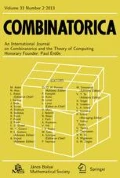Let f(n, d) denote the least integer such that any choice of f(n, d) elements in \( \mathbb{Z}^{d}_{n} \) contains a subset of size n whose sum is zero. Harborth proved that (n-1)2d +1 ≤ f(n,d) ≤ (n-1)n d +1. The upper bound was improved by Alon and Dubiner to c d n. It is known that f(n-1) = 2n-1 and Reiher proved that f(n-2) = 4n-3. Only for n = 3 it was known that f(n,d) > (n-1)2d +1, so that it seemed possible that for a fixed dimension, but a sufficiently large prime p, the lower bound might determine the true value of f(p,d). In this note we show that this is not the case. In fact, for all odd n ≥ 3 and d ≥ 3 we show that \( f{\left( {n,d} \right)} \geqslant 1.125^{{{\left[ {\frac{d} {3}} \right]}}} {\left( {n - 1} \right)}2^{d} + 1 \).
Lower Bounds For Multidimensional Zero Sums
- Original Paper
- Published:
- Volume 24, pages 351–358, (2004)
- Cite this article
-
173 Accesses
-
21 Citations




